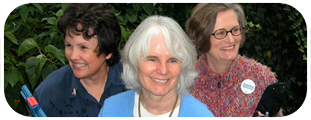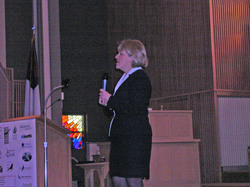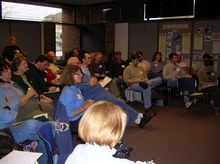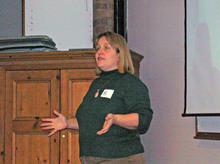One of the big challenges/opportunities for Democrats coming out of this last election cycle has been the question of how to harness the energy unleashed by Howard Dean supporters. There is a general sense that none of the other major Democratic figures, including John Kerry, fully understood that desire to be involved and make a contribution. In the end that seems to be a major reason why the Democratic establishment finally turned to Dean as DNC Chair. The grassroots was with him from the beginning.
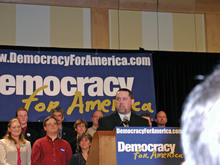 Ray Minchew and the Democracy for Washington organization have been at the forefront of learning to work with this new grassroots energy.
Ray Minchew and the Democracy for Washington organization have been at the forefront of learning to work with this new grassroots energy.
Democracy for Washington is an offshoot of Democracy for America, the original Dean organization that grew out of his primary race. We interviewed Ray about how his organization has defined itself and what it is doing to build a core of active, effective organizers from the ranks of the people brought more deeply into the political process in this last year and a half.
See the extended entry for the interview. You may also be interested in the interview with Dean Nielsen and Progressive Majority that we did last week.
Interview with Ray Minchew, Director of Democracy for Washington
Q. Clarify first how Democracy for Washington and Democracy for America work together.
RM: Democracy for America (DfA) deals with the larger national issues. We formed Democracy for Washington (DfW) a year ago as a way of having a local conversation and to serve as a focal point for the Howard Dean organization in this state. There is no sharing of funds. Federal regulation doesn't allow that. We communicate about events and may put things up on each other's blogs. That's it.
Q. Talk a bit about the Howard Dean phenomenon.
RM: During the primary, Howard Dean meant a lot to a lot of people. He was able to give people a sense that they could be engaged as activists at every level. The campaign put out a blog that was very empowering to people and gave them a sense that they were being listened to and they could have an impact on the Presidential race.
When I formed DfW, along with some other folks, we came to realize that Dean was what I now call a "value sponge".
Like Bush seems to be? Yes.
People everywhere thought that Dean shared their beliefs, their values. I had never thought that my views and Dean's views overlapped 100%. But when I started to clarify what Dean believed, I got a lot of push-back. People had different understandings of what they thought Dean stood for and it was hard to get everyone on the same page.
The genius of Howard Dean and Joe Trippi was that they relinquished control. It is a very difficult thing to do. The impulse is to keep control of the reins, not to let it go. It is very gutsy to say that we're going to let the grassroots run this thing. And that's what they did.
Q: Have any of the other Democrats figured that out yet?
RM: John Kerry ran a very good campaign but he never got that idea of fully engaging activists at every level. Paul Berendt genuinely understands what Dean did and wants to do the same thing. He is struggling with how to do it.
Q: Is there a downside?
RM: Certainly. Howard Dean got into trouble with a lack of message control. He is moving toward more of a middle ground now. I think Paul Berendt is also moving toward that middle ground, like many Democratic leaders.
There are lots of Dean folks in the Party organization now. It will make a big difference.
Q: So why and how did you start Democracy for Washington?
RM: Many of the Dean staffers played poker every Tuesday night and we just kept playing and talking even after Dean lost the primary. We debated what to do. Should we join another organization? After a while it became obvious that there needed to be a place where people could go with that energy that had come out of the Dean organization. We looked at how to do that. We didn't want to wait for the DfA to come up with something.
I kept asking people who we could get to lead this organization. Finally I just did it. Most of us were new to politics so we stumbled around a bit. We turned to our existing network to build an email list and a website. We didn't quite know what we were going to do and worked hard to figure that out. Luckily we had a lot of active people in the Puget Sound area and they showed up and brought friends and became involved.
Initially we saw ourselves as a Dean organization but the Kerry and Kucinich folks asked us to open up and accept new people. Interestingly enough, in the process we lost some of the Dean folks.
Q: What have you done since then?
RM: We organized a successful Democratic gubernatorial forum here early spring with Gregoire, Sims and Talmadge. Other than that, during the campaign season we were part of the general noise, not highly successful. We sent people to work for Kerry and for Don Barbieri. We worked with Jay Inslee to sponsor two showings of "Fahrenheit 9/11" which raised $5,000 that went to some local candidates and to MoveOn.org.
Q: And since the election? What have you done and what are you planning on doing?
RM: We held a meeting to get organized and pass some bylaws. Next, we are going out around the state to talk with local activists in Yakima, Spokane, Bellingham, Vancouver and Olympia. We want to teach people at the local level how to identify people who can win elections. And we want to find out what they want DfW to do.
Once we get through the initial round of meetings, we'll start talking about the 2005-2006 elections. We want to be out in front, organizing in neighborhoods. We will start focusing on networking events and pull people together to go out and do the work that needs to be done. Politicians need to see that DfW can help them. We want them to see that we will cover their backs so that they can take more risks. We believe that recruiting progressives is critical. We want to find our own people and build our bench.
Q: How do you work with other organizations like the Democratic Party and Progressive Majority?
RM: We haven't worked really closely with the Democratic Party lately other than helping them to advertise events. The Party has been responding to the Republican re-vote campaign and that's not really our role. But we are sending people into the Democratic Party. We hope to be more closely aligned with the DNC, especially now that Dean is the new Chair.
We work closely with Dean Nielsen, Director, and Edie Gilliss, Political Director, over at Progressive Majority. They have a lot more political experience and are helping us get organized. We meet every few weeks to talk about goals.
Q: What do you see changing as a result of Dean becoming the Chair of the DNC?
We believe that Dean was our Goldwater, changing how people view politics. His campaign will affect campaigns moving forward. We are asking our base to donate monthly membership dues right away to the DNC to show our support for Dean.
